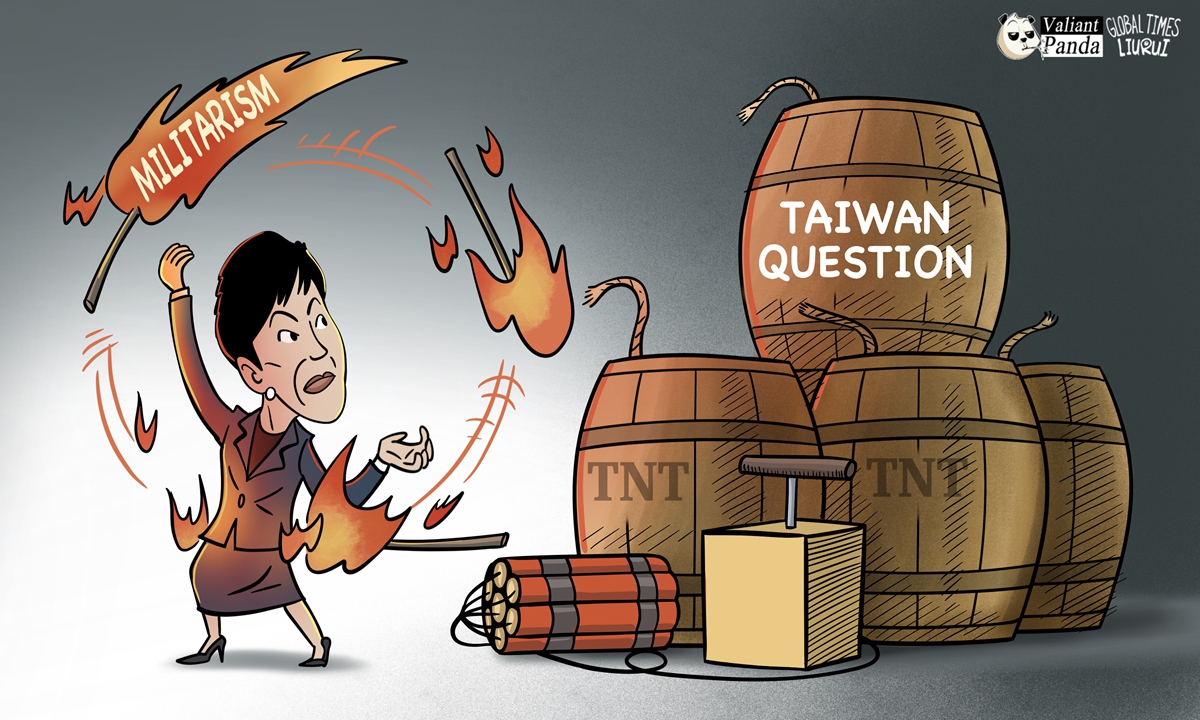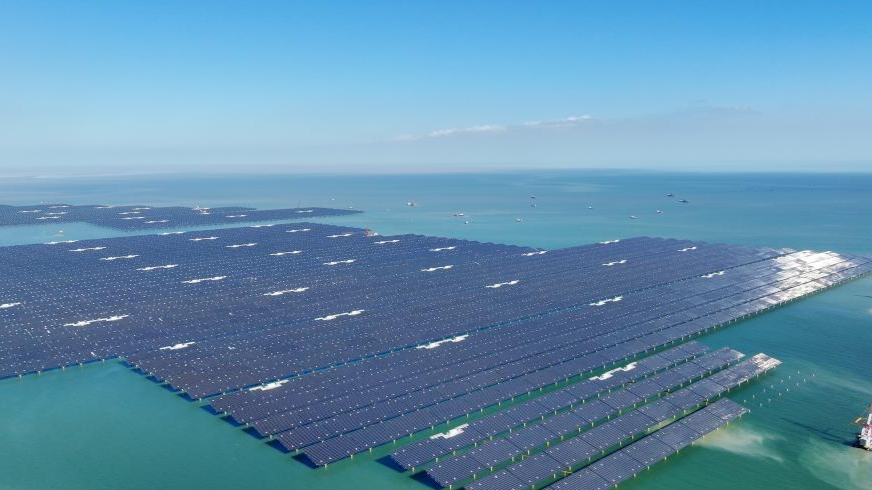Deploying missiles on the island: The specter of militarism haunts Japan

Illustration: Liu Rui/GT
Japan's Defense Minister Shinjiro Koizumi recently inspected a Self-Defense Forces base in the Ryukyu Islands and announced that the plan to deploy Type 03 Chu-SAM missiles on Yonaguni Island would move forward. Koizumi claimed that the move is intended to "lower the chance of an armed attack on Japan" and stressed that "the view that it will heighten regional tensions is not accurate." Yet this seemingly "self-defensive" narrative is, in fact, a direct challenge that threatens regional peace and stability. By deploying offensive weapons on the southwestern island near the island of Taiwan, Japan is not only deliberately creating tension and provoking military confrontation, but also reviving the long-dormant specter of militarism - something that should raise high alert among neighboring countries and the international community.
As the westernmost point of the Ryukyu Islands, Yonaguni Island lies only about 110 kilometers from the island of Taiwan. This geographical proximity means that any military deployment there carries a high degree of danger and clear strategic targeting. Currently, Yonaguni is equipped with a radar monitoring facility designed to scan nearby seas and airspace. An electronic warfare unit established by Japan in 2024 is also stationed on the island, tasked with disrupting other countries' communications and guidance systems. If missiles are deployed on the island in the future, it would essentially be a highly targeted offensive deployment, creating a new point of military confrontation, which would disrupt the strategic balance around the Taiwan Straits and could even become a source of regional tension.
The actions of the Japanese government have not only aroused high alert among neighboring countries and the international community but also completely ignored the opposition from local residents. Whether on Yonaguni Island or Ishigaki Island, locals generally worry that Tokyo's military deployments will turn their homes into potential battlefields and place them on the front line if conflict breaks out. Ishigaki city assembly member Shiro Hanatani told the Global Times with evident concern that many residents oppose deploying missiles capable of striking other countries' territory. In particular, beefing up military forces on Ishigaki and nearby areas will be seen by others as a threat. Ordinary Japanese people have experienced the horrific suffering of the Battle of Okinawa and the atomic bombings, and they understand all too well the terror of war.
What is even more alarming is that the missile deployment on Yonaguni Island is not an isolated move, but rather the inevitable result of Japan's systematic military expansion and its drift toward militarism in recent years. When viewed alongside Japanese Prime Minister Sanae Takaichi's erroneous remarks on Taiwan, this development is extremely dangerous. The slogan "a Taiwan contingency" has become a vessel for Japan's long-held attempt to allow its military forces to "set sail," and placing medium-range missiles on Yonaguni suggests that the specter of militarism is once again lingering over Japan. From the 2015 security legislation that loosened postwar constraints and allowed for collective self-defense, to acquiring "counterstrike capabilities," shifting away from the "exclusively defense-oriented" posture, and now contemplating abandoning the "Three Non-Nuclear Principles," Japan has been step by step shedding the restraints of the post-WWII peace framework. Its true intention is unmistakable: to hype up so-called "external threats" in order to legitimize the expansion of the Self-Defense Forces, broaden the scope of military activities, and ultimately fulfill its ambition of becoming a military power.
Japan's actions completely deviate from historical justice and its commitment to peace. As a defeated nation in WWII, it is Japan's basic obligation to profoundly reflect on its history of aggression, adhere to its pacifist constitution, and maintain regional stability. However, its various actions today are strikingly similar to the tactics employed by Japanese militarism in the past to launch foreign aggression under the pretexts of "survival-threatening situation" and "self-defense" - such as exaggerating nonexistent "security threats," creating a tense regional atmosphere, and even actively provoking incidents to promote military expansion.
Taiwan belongs to China. How to resolve the Taiwan question and realize national reunification is a matter for the Chinese people to decide and brooks no interference by any external force. International legal documents such as the Cairo Declaration and the Potsdam Proclamation have already clearly established the fact that Taiwan is returned to China. China will never allow external forces to lay their hands on its Taiwan region, as this relates to the political foundation of China-Japan relations and Japan's fundamental trustworthiness. This is a non-negotiable red line for China. China will never allow Japan's right-wing provocateurs to turn back the wheel of history, as this concerns the peace and welfare of the Asia-Pacific region and international fairness and justice, which is a bottom line that all countries should jointly uphold. The Japanese administration's attempts to intervene in the Taiwan Straits affairs with a "new type of militarism" are not only a serious disruption to China-Japan relations but also a blatant infringement on international justice and a provocation against the post-war international order.
The Japanese government should clearly recognize that turning the southwestern Islands into a military front will not bring so-called "security"; it will only make the regional situation more dangerous. Manipulating the Taiwan question will not garner international support; it will only expose the fact that Japan has insufficiently reflected on its history. Ignoring public opinion and pursuing military expansion is not the path to building a strong nation, but rather the beginning of a repeat of past mistakes.
Countries around the world, especially Asian neighbors, should be jointly vigilant about the extreme dangers posed by Japan's "new type of militarism." History has repeatedly proven that peace is hard-won, must be defended, and that militarism not only endangers the world but is also destined for self-destruction.
Photos
 Promotion week for intangible cultural heritage brands opens in Dali, China's Yunnan
Promotion week for intangible cultural heritage brands opens in Dali, China's Yunnan First batch of wintering black-headed gulls arrive at Lugu Lake in Yunnan
First batch of wintering black-headed gulls arrive at Lugu Lake in Yunnan Highlights of women's doubles of badminton at National Games
Highlights of women's doubles of badminton at National Games China's Shandong develops green energies to advance new energy structure transformation
China's Shandong develops green energies to advance new energy structure transformation
Related Stories
- Japan's gesture of being 'willing to engage in dialogue' is highly hypocritical: Global Times editorial
- FM: Nations entitled to stop return of Japan militarism
- If Japan to follow old path of militarism, it will ultimately end in failure: Chinese spokesperson
- Japan's benchmark Nikkei plunges on weak tech issues
- China urges Takaichi to retract wrongful remarks for strategic, mutually beneficial relationship with China
- If Japan to follow old path of militarism, it will ultimately end in failure: Chinese spokesperson
- Takaichi's dangerous provocations expose Japan's right-wing revisionism, resurgent militarism
- Takaichi's remarks on Taiwan "despicable act betraying diplomatic trust" -- head of Korea-China City Friendship Association
- Japan must give a clear explanation to these 7 questions
- Japan should not cross line step by step while claiming stance unchanged regarding Taiwan: Chinese spokesperson
Copyright © 2025 People's Daily Online. All Rights Reserved.





